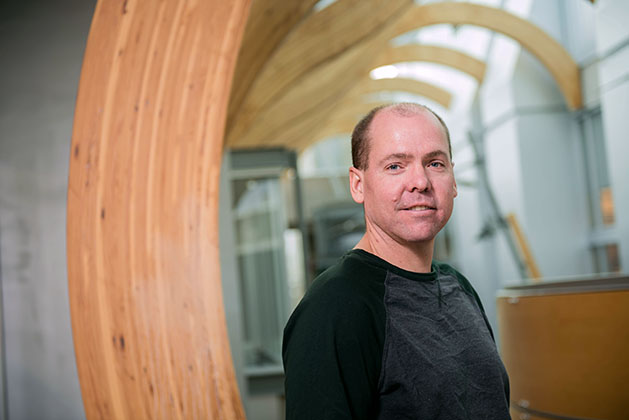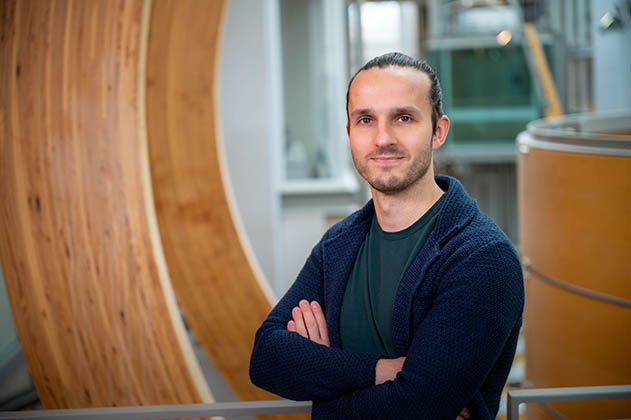Newsroom
Drs. Leonard Foster and Marco Todesco receive GIRAFF funding
From kelp to hops, bees to berries, BC researchers are harnessing the power of genomics to solve challenges facing the province’s agriculture and aquaculture sectors that stem from climate change.
Eight new projects have received a combined $1.84 million in funding from the Genomic Innovation for Regenerative Agriculture, Food and Fisheries (GIRAFF) program – a collaboration between Genome BC and the Investment Agriculture Foundation of BC (IAF) with support from the BC Ministry of Agriculture and Food.
To combat the impacts of climate change on the agricultural and natural resources of BC, a comprehensive range of solutions is required. “These projects are developing new genomic tools and approaches, that will help producers mitigate and adapt to the impacts of climate change,” said Federica Di Palma, Chief Scientific Officer and Vice President, Research and Innovation at Genome BC.
Among the eight projects are initiatives that will:
- Breed disease and drought-resistant traits into hop varieties to enhance their resilience to climate change, with the long-term goal of revitalizing BC’s hops industry
- Contribute to an early-warning system for Canadian farmers by monitoring pathogens that affect wheat crops
- Create tools that can evaluate how well Chinook Salmon populations can handle climate events, like heatwaves, with the goal of identifying salmon stocks that are more resilient to temperature changes.
“We need to be continuously innovating to improve local food sustainability and the GIRAFF program is giving researchers in B.C. the chance to play an active role in reducing threats to food production,” said the Hon. Pam Alexis, Minister of Agriculture and Food. “Innovations like these will be crucial not only to ensuring food security and responding to impacts from climate change, but also for lasting prosperity and a growing food economy for British Columbians.”
The GIRAFF program is a pioneering initiative dedicated to delivering genomic solutions that bolster the resiliency and sustainability of BC’s agriculture, food and fisheries sectors. It harnesses IAF’s experience as an industry-led organization and Genome BC’s expertise in connecting academic researchers, industry partners and public policy priorities to deliver enduring, sustainable benefits for BC.
“Climate change poses significant challenges to global agriculture. To face these challenges and ensure food security we must develop crops that are more resilient, productive, and adaptable,” said Christopher Reed, Chief Operating Officer at IAF. “The use of genomics in agriculture will advance the development of climate-resilient crops, thereby enhancing food security and promoting sustainable agricultural practices that demand fewer resources.”

Dr. Leonard Foster
MSL FUNDED PROJECTS:
Identifying climatic determinants of pollinator health by Leonard Foster of UBC and Lan Tran of Agriculture and Agri-Food Canada. The project is using models to study how landscape differences, weather patterns and food availability, in combination with pest and pathogen prevalence, will impact overall bee health. The models developed in this project will provide a better understanding of how climate change will affect bee health and help BC beekeepers, crop growers and policymakers to prepare and take preventative steps to mitigate future challenges.
Adapting cannabis for outdoor production to reduce greenhouse gas emissions by Marco Todesco of UBC and José Celedon of Aurora Cannabis. Indoor cannabis production has an extreme carbon footprint. One possible solution is to switch to outdoor production. However, current elite varieties are sensitive to day-length and will not flower until late summer, making the crop vulnerable to cold/wet weather conditions. The project aims to develop varieties more suited to outdoor cultivation for the Canadian climate.

Dr. Marco Todesco
RESEARCHER QUOTES:
“Honey bee health can be affected by many factors, including climate and geography. In this study, we are mining an enormous dataset of BC and Canadian bee health measurements, including the microbiome. We will correlate these data with geographical and climate data to determine which factors are most important for bee health. The result will be best practices advice on how to better manage bees in certain situations.”
– Quote by Dr. Leonard Foster, University of British Columbia and Dr. Lan Tran, Agriculture and Agri-Food Canada, project leads; and Dr. Marta Guarna, Agriculture and Agri-Food Canada, project conceptualization
“The cannabis industry plays an important role in the BC economy, but unfortunately cannabis cultivation in indoor facilities also has an enormous carbon footprint. Our project uses leading-edge genomics technologies to help develop more sustainable cannabis varieties that can be grown outdoor at Canadian latitudes, reducing greenhouse gas emission from cannabis cultivation in BC and beyond.”
– Dr. Marco Todesco, Assistant Professor, Biodiversity Research Centre, University of British Columbia
About Genome British Columbia:
Genome BC is a not-for-profit organization supporting world-class genomics research and innovation to grow globally competitive life sciences sectors and deliver sustainable benefits for British Columbia, Canada and beyond. The organization’s initiatives are improving the lives of British Columbians by advancing health care as well as addressing environmental and natural resource challenges. In addition to scientific programming, Genome BC works to integrate genomics into society by supporting responsible research and innovation and foster an understanding and appreciation of the life sciences among educators, students, and the public. genomebc.ca
About the Investment Agriculture Foundation of BC:
The Investment Agriculture Foundation of BC (IAF) delivers programs and services to support a thriving agriculture and agri-food sector in British Columbia. With more than 25 years of experience, IAF is recognized as the leading provider of high-quality and cost-effective program delivery services for the agriculture and agri-food sector in BC. Since 1996, IAF has delivered more than $250 million to industry on behalf of the federal and provincial governments. iafbc.ca
The original version of this article was posted by Genome BC